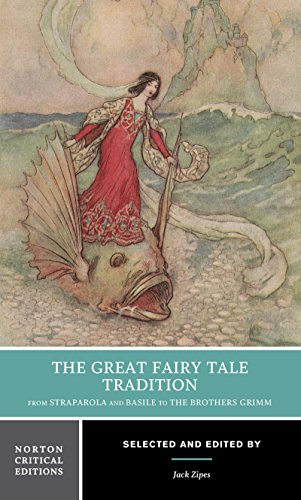 Reddit reviews The Great Fairy Tale Tradition: From Straparola and Basile to the Brothers Grimm (First Edition) (Norton Critical Editions)
Reddit reviews The Great Fairy Tale Tradition: From Straparola and Basile to the Brothers Grimm (First Edition) (Norton Critical Editions)
We found 3 Reddit comments about The Great Fairy Tale Tradition: From Straparola and Basile to the Brothers Grimm (First Edition) (Norton Critical Editions). Here are the top ones, ranked by their Reddit score.

Which brings me to my third point: no, children were not originally the target audience of fairy tales. Children were often included in the audience, but they were not the primary audience. As such, the tales had lots of violence, lots of sex, lots of bawdy jokes and references, and lots of frank discussion about issues that impacted the storytellers’ worlds. For some context on when these stories might have been told, women often told such tales to each other while doing domestic work, chores, and other activities, or together with men around the fire after the children had gone to bed. They were chiefly for entertainment purposes, though there were often lessons embedded in them (because most tales do, after all). Writers, editors, and storytellers began to utilize fairy tales in 18th and 19th-century Europe in the moral and cultural education of children. Before that, they were chiefly for adults, whether for the teaching of lessons or entertainment purposes, which is why so many of the tales are particularly gruesome or filled with sexual exploits: they are not sanitized for children.
The Grimm brothers were trying to please two different audiences. Their first edition was not meant for children at all, and was instead a scholarly pursuit with them trying to record the tales faithfully, even down to colloquial language; they did this largely for nationalist reasons to create a unified German cultural story, at least partially based on Johann Herder’s fundamental philosophy centered around the idea that the only way for Germany (and thus, any nation) to revitalize its sense of self was through the collection and distribution of folklore, which Herder saw as “the summation of the national soul expressed in the poems of the folk”. It was only when people began buying the book and telling the stories to their children, complaining that the stories were too graphic in nature, that the Grimm brothers started extensively editing and sanitizing the tales. Many of the Christian references were added because of harsh criticism that they weren't Christian enough, for example. In Wilhelm’s later versions, he was bending to the will of middle-class parents and the church who wanted the stories to be made suitable for children. The Grimm brothers were poor (they were eating one meal a day at one point because they couldn't afford enough food), and so to maximize financial success when the collection began to get popular, they began to sanitize and edit them to make them more suitable. Disney is not the first to sanitize fairy tales, and the supposedly "dark original versions" are themselves sanitized or changed to fit with the desires of their primary audience.
Ultimately, fairy tales get changed because fairy tales occupy a unique space in the literary landscape: as a genre, they (along with other types of folklore) provide a culture with a single unifying collection of tales the population can claim as “theirs”. This unifying cultural story narrates the life of the people, complete with specific geographical landmarks, cultural/regional issues, and identifying characteristics that mark a tale as coming from “our culture”. It is tribal in nature: the differences between tales help distinguish “us” from the collective “them” by identifying and changing aspects of a cultural/oral narrative. Additionally, they give any particular population a romanticized national narrative of their history and cultural geography, assist in the education of new members (such as children/young adults or immigrants) of the cultural identity of the group, and address issues uniquely important to that culture.
For further reading, I recommend the following books and articles:
Folk tales - preferably from non-Western traditions like :
https://www.amazon.com/Great-Fairy-Tale-Tradition-Straparola/dp/039397636X/ref=pd_sim_14_1?_encoding=UTF8&psc=1&refRID=RR4X6Y2X4TETCFG0YXEH
or
https://www.amazon.com/Folk-Fairy-Tales-Martin-Hallett/dp/155111898X/ref=sr_1_14?ie=UTF8&qid=1504822416&sr=8-14&keywords=folk+tales
It's on amazon if you want to check it out: http://www.amazon.com/Great-Fairy-Tale-Tradition-Straparola/dp/039397636X
Zipes is a pretty strong authority on pre-grimms fairy tales, so if that's the area you are looking into then he would definitely be a good starting place.